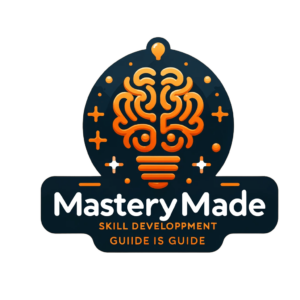As we navigate the complexities of daily life, mastering the art of effective time management is more critical than ever. Here, we share time management techniques that promise to turn the tide in how you handle your hours. We believe that Time Management Mastery isn’t just about crossing off items on a to-do list; it’s about making those hours count. With the right time management skills, every moment becomes an opportunity for progress and satisfaction.
Whether it’s juggling personal commitments or meeting professional deadlines, the need for effective time management has never been more pronounced. Our time management tips aren’t your standard fare—expect the unexpected as we delve into strategies that will not only surprise you but will also equip you to wield your time with finesse and agility.
Key Takeaways
- Discover unconventional time management hacks for enhanced daily productivity.
- Understand the profound impact of Time Management Mastery on your overall satisfaction.
- Learn to navigate and sculpt your schedule using proven time management tips and skills.
- Embrace transformative time management techniques for long-term benefits.
- Gain the confidence to take control of your time and tasks with innovative strategies.
Unlocking the Secrets of Effective Time Management

As we dive deeper into the quest to improve time management, it’s essential to understand that beneath every efficient schedule lies a framework of tried and true time management principles. Today, we’re peeling back the layers to reveal the core elements that propel these strategies. By adopting this knowledge, we can elevate our day-to-day productivity and carve out a variant of success that resonates with our personal and professional goals.
- Analyze current time usage
- Establish clear, actionable goals
- Prioritize tasks based on importance and urgency
- Allocate time deliberately and strategically
- Embrace the power of saying ‘no’ to non-essential tasks
- Implement regular review and adjustment periods
Integrating these time management strategies requires more than just awareness; it calls for a decisive commitment to restructuring the way we interact with our time. Let’s embark on a journey of self-improvement, where we can learn, integrate, and ultimately master the domain of our hours and minutes.
It begins with a simple reflection—how are you using your time right now? Are there tasks you perform that do not align with your objectives? Recognizing the discrepancies between your goals and your current time allocation is the first step towards realignment and optimization.
Next, we prioritize. Deciding what requires our immediate attention and what can wait is a critical component of effective time management. Not all tasks are created equal, and understanding this hierarchy lays the groundwork for a more organized approach to our daily endeavors.
“The key to time management is not to prioritize what’s on your schedule, but to schedule your priorities.” – A thought-leader in productivity
We all have the same number of hours in a day, but it’s how we choose to fill those hours that truly makes a difference. In our ongoing discussion, we encourage you to reflect on these elements and consider how you can incorporate these time management principles into your lifestyle. Through intentional practice and consistent application, we can all stand to benefit from a life less chaotic and more harmoniously paced.
Time Management Mastery: Elevating Your Efficiency
Embarking on the journey to time management mastery, we begin by establishing a bedrock of timeless time management principles. These fundamental philosophies nurture the growth of robust time management skills and lay the groundwork for developing sustainable time management habits.
Understanding Time Management Principles
Grasping the essence of effective time management is akin to discovering the secret ingredients to a recipe for success. Core concepts such as prioritization, goal setting, and task delegation form the pillars of efficient time planning. Let’s cultivate these principles to form the basis for transformative habits that accelerate our personal and professional growth.
Employing Time Management Tools for Success
In the age of innovation, a plethora of time management tools stands ready to revolutionize the way we handle our ever-growing to-do lists. From the digital prowess of task management applications like Asana and Trello to the tactile satisfaction of a well-organized planner, we explore tools tailored to individual preferences and work styles.
Successful people are not gifted; they just work hard, then succeed on purpose. – G.K. Nielson

Assessing Your Current Time Management Skills
Understanding our existing time management capacity is essential for pinpointing both areas for enhancement and methods that already flourish. It’s time to self-reflect, examine your day-to-day routines, and identify the strengths and weaknesses in your current strategy.
| Time Management Aspect | Self-Assessment | Goals for Improvement |
|---|---|---|
| Prioritization | Do you identify and focus on high-impact activities? | Set clear objectives to tackle high-priority tasks first. |
| Task Delegation | How effectively do you distribute tasks? | Improve by recognizing tasks others can handle efficiently. |
| Digital Tool Usage | Are you leveraging technology to your advantage? | Explore and integrate one new tool into your routine. |
| Daily Planning | Do you have a consistent daily plan? | Create and stick to a daily schedule. |
Armed with this knowledge, we can tailor our time management tactics, shaping tools and techniques that resonate with our personal narrative. Let this be the canvas on which we paint a more productive and balanced life.
Revolutionary Time Management Strategies for the Modern Professional
We understand the demands of today’s workplace; the need for cutting-edge time management strategies has never been more pressing. Embracing new time management habits and implementing forward-thinking time management tips can catapult your professional efficiency to new heights. Let us delve into some transformative approaches that promise to redefine how you manage your time and workload.
- Transition from juggling multiple tasks to focusing on a single task at a time.
- Deep work sessions are structured to maximize concentration, minimizing errors and ramping up productivity.
Automate the Mundane
- Identify repetitive tasks that can be automated with technology, freeing up valuable time for more complex projects.
- Use scheduling tools to manage appointments, emails, and social media posts, ensuring a seamless workflow.
Prioritization Through Quadrants
| Urgent and Important | Important but Not Urgent | Urgent but Not Important | Neither Urgent nor Important |
|---|---|---|---|
| Crises, deadlines | Planning, recreation | Interruptions, some calls | Time wasters, excessive TV |
The Power of ‘No’
- Cultivating the habit of saying ‘no’ to requests that don’t align with your priorities helps maintain focus on your goals.
- It’s essential for preserving time for high-priority tasks and maintaining a healthy work-life balance.
Strategic Scheduling
- Plan your day the night before, considering energy levels and when you’re most productive.
- Block out time for deep-focus work and avoid scheduling meetings during these periods.
Incorporate these strategies into your work habits and watch as not only your productivity but also your professional satisfaction, expands. It’s time to transform the complexities of the modern workplace into opportunities for growth and excellence.
The Art of Making Time Work for You
Our journey towards better time management is not just about the immediate strategies we deploy; it’s about developing a relationship with time that prioritizes our well-being and long-term success. We all strive to improve time management, but the key lies in the subtle art of making time work for us. By consciously adopting robust time management habits and incorporating practical time management tips into our daily routine, we set the stage for lasting benefits and sustained productivity. Let’s delve into how we can make every moment count.
Adopting Time Management Habits for Long-Term Benefits
To truly master our schedules, it’s imperative that we cultivate time management habits that align with our personal and professional goals. These habits become the backbone of our daily productivity, allowing us to execute our tasks with precision and foresight. We understand the significance of this approach and are here to guide you through the process of making these habits an integral part of your life.
- Set Clear Priorities: Begin each day by determining the tasks that will have the most significant impact.
- Avoid Multitasking: Focus on one task at a time, and give it your undivided attention for better outcomes.
- Embrace the Power of “No”: Be selective with your commitments to ensure you don’t overextend yourself.
- Regular Breaks Are Essential: Schedule short breaks to recharge and maintain peak cognitive function throughout the day.
- Reflect Daily: Spend time each day reviewing your accomplishments and setting goals for the next day.
Maximizing Daily Productivity through Time Management Tips
While adopting new habits is fundamental for long-term growth, immediate and actionable time management tips can dramatically increase our daily productivity. We’ve gathered a selection of tips that you can implement right now to begin seeing a difference in how efficiently your time is spent.
- Start Your Day with a Plan: Take 10 minutes in the morning to outline your tasks and allocate specific times to each item.
- Utilize Technology Wisely: Use apps and tools that streamline your workflow, such as to-do list apps and Calendar management systems.
- Limit Distractions: Identify what commonly interrupts your focus and find ways to minimize these distractions.
- Prioritize Your Health: Make sure you’re getting enough sleep, eating well, and exercising to keep your productivity levels high.
- End Your Day with Preparation: Dedicate time at the end of the day to organize your workspace and prepare for the next day.
By focusing on these habits and tips, we affirm our commitment to not just doing more, but doing better. True mastery comes from the balance of efficiency and wellness, leading to a lifestyle where time is not an adversary but a trusted ally in our pursuit of achievement and contentment.
Conclusion
As we reach the end of this enlightening journey into effective time management, we’ve uncovered a trove of strategies that promise to revolutionize the way we utilize our hours. By intertwining time management mastery into the fabric of our daily lives, the cumulative effect of these skills blossoms into enhanced productivity and a more balanced lifestyle. We’ve dissected various approaches and shared actionable insights, all with the aim of empowering you with the expertise to navigate your time with precision and ease.
The pursuit of time management mastery is not about rigid schedules or stifling creativity; it’s about finding the rhythm that harmonizes with your personal and professional desires. From recognizing the value in saying no, to embracing the technology that simplifies task management, each piece of advice has been geared toward carving out moments that matter, moments that propel you toward your aspirations. Armed with these time management skills, you’re now set to tap into an unexplored potential, transforming both ticking seconds and sprawling years into a curated masterpiece of efficiency and purpose.
Together, we’ve delved deep into the techniques that foster effective time management and by applying these principles, we step into a realm of heightened proficiency and satisfaction. As we part ways, take these insights and embed them into your practice; witness the transformation that arises when you claim sovereignty over your time. Let the mastery of time management unfold as an ongoing narrative of success in your story, where every chapter is punctuated with achievements that resonate with the goals you’ve set for yourselves.
FAQ
What are some surprising time management hacks that actually work?
Some unconventional hacks that can significantly improve your time management include the ‘two-minute rule’ where if a task takes less than two minutes, you do it immediately, batching similar tasks together to improve focus, and planning your day the night before to hit the ground running in the morning. Additionally, using a ‘done list’ can give you insight into your productive patterns.
Why is Time Management Mastery crucial in today’s fast-paced world?
Time Management Mastery is vital because it helps us make the best use of our limited time, increases our productivity and work quality, reduces stress by preventing last-minute rushes, and allows us to achieve greater work-life balance. Ultimately, effective time management leads to greater personal and professional satisfaction.
How can I improve my time management?
You can improve your time management by setting clear goals, prioritizing tasks, breaking down large projects into manageable steps, limiting distractions, saying no to non-essential tasks, and regularly reviewing and adjusting your strategies. Learning and incorporating time management principles into your daily routine is also key to continuous improvement.
What time management strategies can modern professionals use to cope with workplace challenges?
To handle the fast-paced professional environment, effective strategies include prioritizing urgent and important tasks using the Eisenhower Matrix, implementing time blocking to allocate dedicated periods to focus on specific tasks, taking regular short breaks to enhance concentration, and using technology tools for automation and efficient communication.
What are some effective time management tools?
Some popular time management tools include digital calendars like Google Calendar, project management software like Trello or Asana, time tracking apps like Toggl or RescueTime, and Pomodoro timers for focused work sessions. Choose tools that align with your work style and help streamline your workflow.
How can I assess and improve my current time management skills?
Start by tracking how you spend your time for a week, noting patterns or time-wasters. Reflect on what tasks align with your goals and which do not. Use this insight to reallocate your time more effectively, set SMART goals for better direction, and adjust your habits to foster a more productive routine.
What time management habits can lead to long-term benefits?
Building habits like planning your day ahead, setting specific times for email and social media, regular review of your goals and priorities, and developing a routine can lead to consistent productivity. Also, fostering resilience against procrastination and maintaining a healthy balance between work and rest can have long-term advantages.
What is the role of time management principles in achieving productivity?
Time management principles act as guidelines to help us make intentional decisions about how we use our time. They encourage us to focus on being effective rather than just being busy, to prioritize tasks based on importance, and to allocate time for both work and rest, thus promoting overall productivity and well-being.
How can I maximize daily productivity with time management tips?
To maximize daily productivity, start with the most challenging tasks when your energy is highest, use the Pareto Principle to focus on tasks that offer the most significant results, delegate when possible, and set clear boundaries to protect your work time. Regularly reassessing your approach to time management can help ensure you are always at your most productive.











